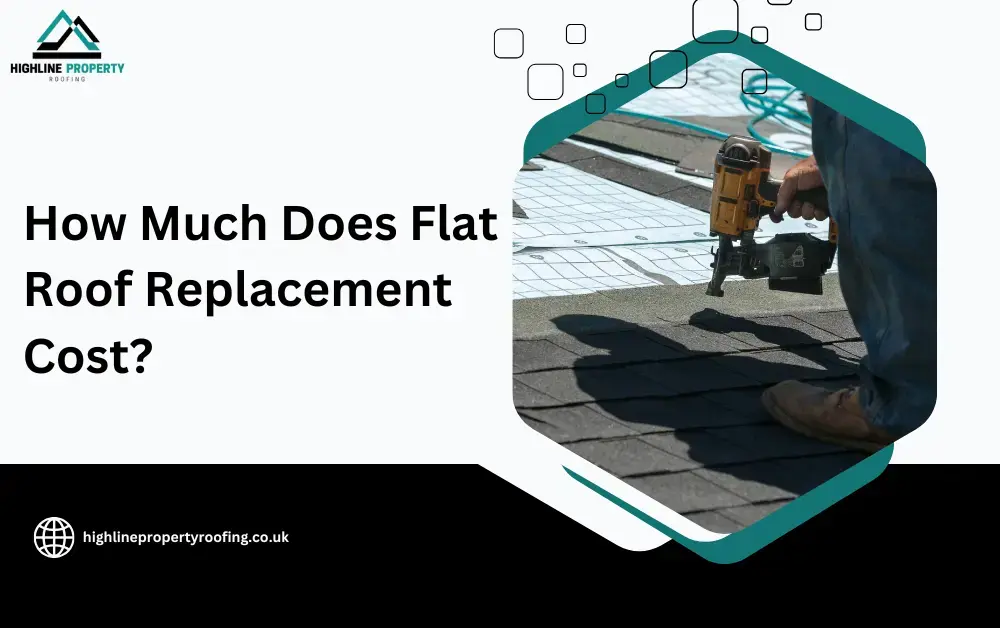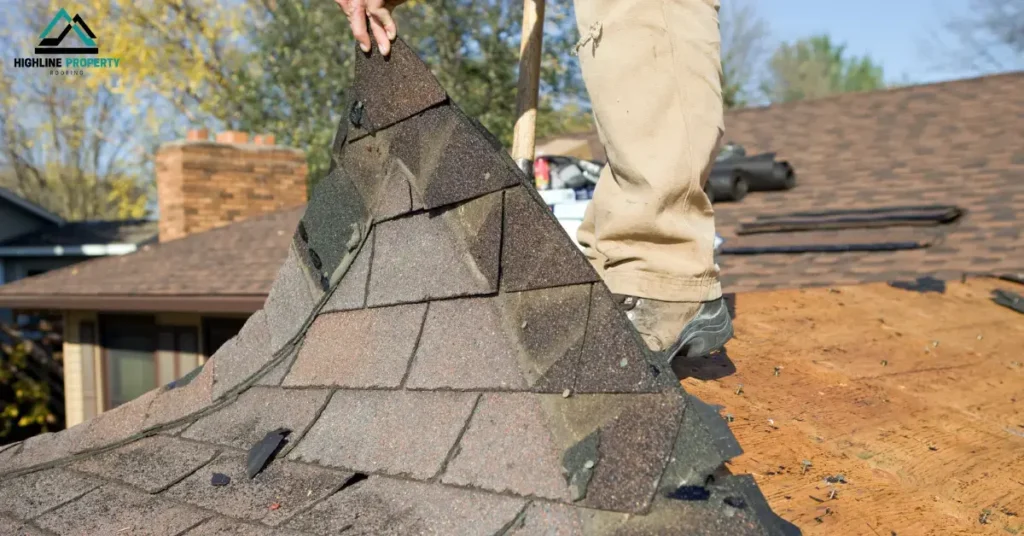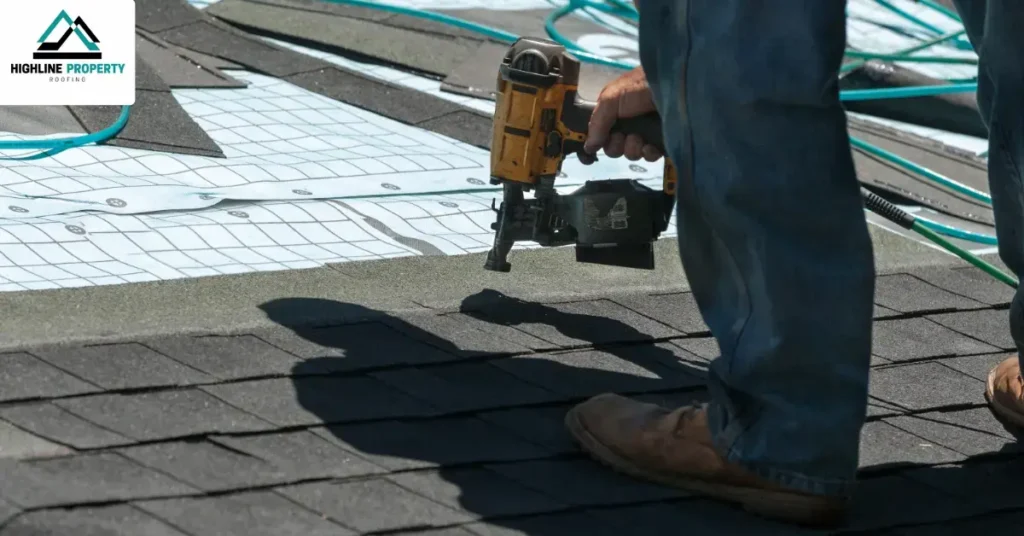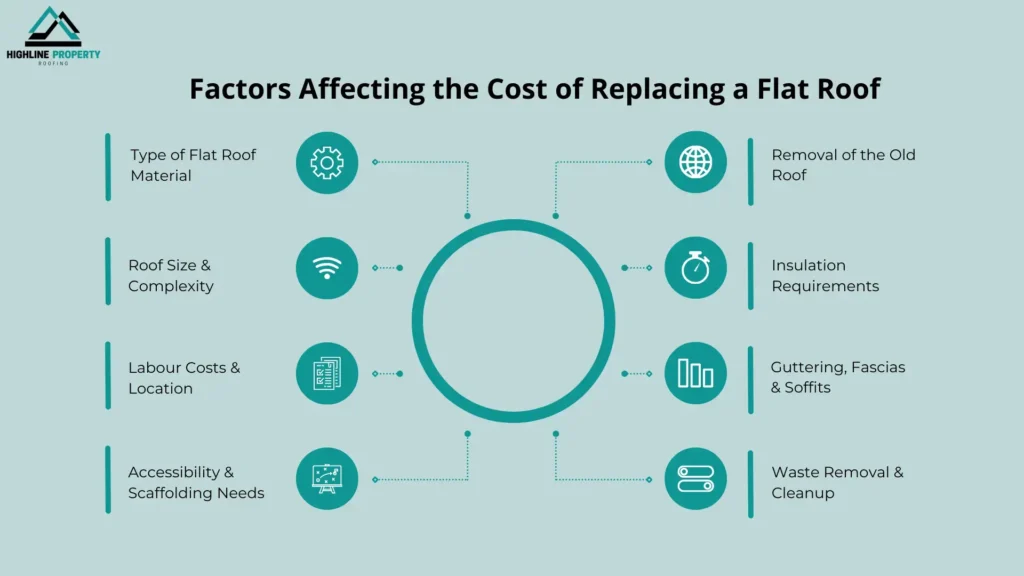Warning: Undefined array key "style" in /home/u595483593/domains/highlinepropertyroofing.co.uk/public_html/wp-content/themes/pearl/partials/header/elements/menu/menu.php on line 79
Warning: Undefined array key "style" in /home/u595483593/domains/highlinepropertyroofing.co.uk/public_html/wp-content/themes/pearl/partials/header/elements/menu/menu.php on line 90
How Much Does Flat Roof Replacement Cost

Understanding flat roof replacement costs is important as prices vary based on roof size, materials, labour, and location. Homeowners often explore costs due to leaks, cracks, or water pooling. Some need minor repairs, while others require full replacement to prevent damage.
The main concern is the total cost and finding a budget-friendly option. Prices differ, with some companies offering low quotes with hidden fees and others charging more for durable materials that last longer.
This expert guide covers the average cost of flat roof replacement, Key factors that affect the costs, price estimates for different materials, and ways to save money. Whether your roof is damaged, leaking, or ageing, understanding these costs helps with planning and making the best choice for your home or property.

How Much Does It Cost to Replace a Flat Roof in the UK?
The average cost of a flat roof replacement depends on the roof size and materials used. Below is an average estimate:
| Roof Size | Estimated Cost (Including Labour) | Duration |
| Small Roof (20m²) (Garage, Shed, Porch) | £1,000 – £2,500 | 2-3 days |
| Medium Roof (50m²) (House Extension, Small Office) | £2,500 – £4,500 | 2-4 days |
| Large Roof (100m²+) (Commercial Buildings, Large Homes) | £5,000 – £10,000+ | 4-7 days |
The price for flat roof replacement may also vary based on location, accessibility, and roofing contractor rates.
Flat Roof Replacement Costs by Material (Per Square Metre)
The flat roof replacement cost per square foot depends largely on the material used. Below is a breakdown of common flat roof materials and their estimated costs per square metre, including labour:
| Flat Roof Material | Cost Per Square Metre (Including Labour) | Lifespan |
| Felt Roofing | £40 – £70 | 10 – 15 years |
| EPDM Rubber | £80 – £120 | 20 – 30 years |
| GRP Fibreglass | £90 – £150 | 20 – 30 years |
| Single-Ply Membrane | £100 – £140 | 20 – 30 years |
| Lead Roofing | £120 – £180 | 50+ years |
| Green Roof | £120 – £200 | 40+ years |
Each material has its pros and cons. Felt roofing is the cheapest option but has a shorter lifespan, while EPDM rubber and GRP fibreglass cost more but are more durable.

Factors Affecting the Cost of Replacing a Flat Roof
Flat roof replacement costs can vary due to several key factors. Some homeowners are surprised by unexpected costs that arise during the process. To help you budget better, here are the main things that influence the flat roof replacement cost.
1. Type of Flat Roof Material
The material used significantly impacts the flat roof replacement cost. Affordable options like felt roofing have shorter lifespans, while premium choices like lead roofing last decades but cost more. EPDM rubber and GRP fibreglass offer durability with moderate pricing, whereas green roofs provide insulation benefits but are expensive to install. Each material affects both cost and longevity.
2. Roof Size & Complexity
The larger the roof, the more materials and labour will be needed, which increases costs. However, size is not the only factor. Complexity also plays a role. If your roof has multiple layers, skylights, or chimneys that need to be worked around, the price will be higher.
3. Labour Costs & Location
Your location affects labour prices. Roofing work in London and the South East is usually more expensive than in smaller towns. Costs also depend on the roofer’s expertise. Experienced professionals may charge more but provide quality work.
4. Accessibility & Scaffolding Needs
If your roof is hard to reach, extra equipment like scaffolding or safety harnesses may be required, adding to the flat roof replacement estimate. Homes with limited access or multi-storey buildings typically have higher costs due to these additional requirements.
5. Removal of the Old Roof
Before installing a new roof, the old one may need to be removed. If the existing flat roof is in poor condition or has multiple layers, it can take longer to strip away, leading to extra labour costs. Some roofing companies include this in their pricing, while others charge separately.
6. Insulation Requirements
UK building regulations require flat roofs to meet insulation standards. If your current roof lacks proper insulation, you may need to add new insulation during replacement. This improves energy efficiency but increases costs.
7. Guttering, Fascias & Soffits
Many homeowners take the opportunity to upgrade their gutters, fascias, and soffits while replacing their roofs. If these parts are damaged, they should be replaced to avoid future problems, but this will add to the total price for flat roof replacement.
8. Waste Removal & Cleanup
Roof replacement generates a lot of debris, including old roofing materials, insulation, and other waste. Some contractors include waste disposal in their quotes, while others charge separately. If waste removal isn’t covered, you may need to hire a skip, adding to your expenses.
By considering these factors, you can get a clearer flat roof replacement estimate cost and avoid unexpected expenses. Understanding these costs in advance allows you to plan a budget that works for you.

How to Reduce Flat Roof Replacement Costs
- Get Multiple Quotes – Compare prices from different roofers to find the best deal.
- Choose Budget-Friendly Materials – Felt and EPDM rubber cost less while still being durable.
- Pick the Right Time – Roofing work is cheaper in off-peak seasons.
- Repair Instead of Replace – If damage is minor, fixing it may be enough.
- Do Small Tasks Yourself – Removing old materials or cleaning the area can lower labour costs.
- Check for Grants or Insurance – Some repairs might be covered, saving you money.
- Skip Unnecessary Extras – Avoid costly add-ons like skylights unless needed.
These simple steps can help you save money while keeping your roof in good shape.
Conclusion
The cost of replacing a flat roof varies based on size, material, and labour. While a small flat roof replacement estimate can start at £1,000, larger roofs or premium materials can cost significantly more. Choosing the right contractor and material is key to balancing cost and durability.
If you need a precise flat roof replacement estimate cost, consult with a professional Local roofer for an accurate assessment based on your specific needs.
FAQs
How much does it cost to replace a flat roof per square metre?
The flat roof replacement cost per square metre varies depending on the material. Felt roofing costs between £40 – £70 per m², while premium options like lead roofing range from £120 – £180 per m², including labour.
How do I know if my flat roof needs replacing or just repairs?
Signs like frequent leaks, water pooling, sagging, or visible cracks suggest a replacement might be necessary. If the damage is minor, repairs may be enough.
What is the most durable material for a flat roof?
Lead roofing lasts the longest, over 50 years, but is expensive. EPDM rubber and GRP fibreglass offer 20-30 years of durability with moderate costs.
Can I install a new flat roof over the existing one?
In some cases, a new roof can be installed over the old one, but this depends on the condition of the existing roof and local building regulations.
What’s the best season to replace a flat roof?
Late spring to early autumn is ideal, as dry and mild weather conditions help ensure proper installation and sealing.
